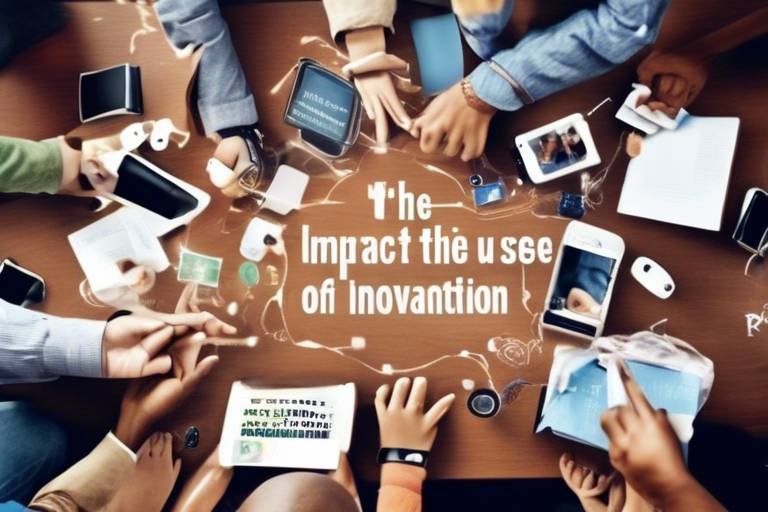The Influence of Technology on Work Ethics
In today's fast-paced world, technology has become a driving force behind the transformation of work ethics. Gone are the days when employees clocked in and out, adhering strictly to a 9-to-5 schedule. Instead, we are witnessing a seismic shift in how work is perceived, executed, and valued. This article delves into the myriad ways technology has reshaped our work ethics, highlighting both the benefits and challenges it presents in the modern workplace.
At the heart of this transformation is the idea that technology has not only enhanced productivity but also redefined the very fabric of professional relationships. With tools like video conferencing, instant messaging, and collaborative platforms, teams can work together seamlessly, regardless of geographical barriers. However, as we embrace these advancements, we must also grapple with the implications they have on our ethical standards and expectations.
As we explore the influence of technology on work ethics, it’s essential to consider how these changes affect not just productivity but also communication and employee well-being. Are we becoming more efficient, or are we sacrificing our personal lives at the altar of constant connectivity? The answers to these questions will shape the future of work and the ethical frameworks that guide us.
To truly understand the impact of technology on work ethics, we must first examine the historical context. Work ethics have evolved significantly over the decades, influenced by various factors such as industrialization, globalization, and now, digitalization. In the past, a strong work ethic was often synonymous with long hours and unwavering dedication to a single employer. However, technology has introduced new paradigms that challenge these traditional notions.
Today, flexibility and adaptability are key components of work ethics. Employees are expected to juggle multiple responsibilities, often working from home or on-the-go. This evolution has led to a rethinking of what it means to be a "good" employee. No longer is it just about the hours spent at a desk; it's about the outcomes produced, the creativity harnessed, and the collaborative spirit fostered among team members.
The rise of remote work, propelled by technology, has fundamentally altered the landscape of work ethics. On one hand, remote work offers unparalleled flexibility, allowing employees to design their work schedules around personal commitments. This can lead to increased job satisfaction and a greater sense of autonomy. On the other hand, it raises questions about productivity and accountability. How do we ensure that employees remain engaged and motivated when working from home?
Technology has played a pivotal role in enhancing work-life balance for many individuals. With the ability to work from anywhere, employees can better integrate their professional and personal lives. However, this newfound freedom comes with its own set of challenges. The lines between work and home often blur, leading to potential burnout. Are we truly "off the clock" when our devices are always within reach? This ethical dilemma requires careful navigation.
Flexible working hours, enabled by technology, allow employees to manage their time more effectively. However, this flexibility can create unrealistic expectations of constant availability. While it’s great to have the option to work at odd hours, it can also lead to a culture where employees feel pressured to respond to emails or messages at all hours. This shift in expectations can significantly impact overall work ethics, as the pressure to be perpetually connected can erode trust and respect among colleagues.
With advancements in technology, employers now have the capability to monitor employee productivity more closely than ever before. While this can lead to increased efficiency, it also raises ethical questions about privacy and trust. How much oversight is too much? Striking the right balance between accountability and autonomy is crucial to fostering a healthy workplace culture.
Technology has revolutionized the way we communicate and collaborate in the workplace. Gone are the days of relying solely on face-to-face meetings; now, we have a plethora of tools at our disposal. However, this transformation also presents challenges in maintaining professionalism and respect in virtual interactions. Miscommunication can easily occur in written messages, leading to misunderstandings and conflicts. It’s essential for organizations to cultivate a culture of clear communication, even in a digital environment.
As technology becomes increasingly integral to work, understanding its ethical implications is more crucial than ever. Issues related to data privacy, cybersecurity, and the responsible use of AI in decision-making are at the forefront of discussions about work ethics. Organizations must establish clear guidelines to navigate these complexities and protect their employees.
The collection and use of employee data raise significant ethical questions about consent and privacy. Organizations must implement clear policies and practices to safeguard individual information. Transparency is key; employees should be informed about what data is collected and how it is used. This approach not only fosters trust but also aligns with ethical standards in the workplace.
The integration of AI in workplace decision-making processes introduces a new layer of ethical challenges. Issues such as bias and accountability must be addressed to ensure fair and just outcomes. Organizations need to establish ethical guidelines for AI usage, ensuring that technology serves as a tool for enhancement rather than a source of inequality.
As technology continues to evolve, the future of work ethics will be shaped by emerging trends. Organizations will need to adapt and reassess their ethical standards to keep pace with these changes. With the rapid advancement of technology, ongoing dialogue about ethics in the workplace will be essential. What does it mean to have a strong work ethic in a world where technology is constantly shifting the landscape? The answers will define the new norms of professional behavior and expectations.
- How has technology changed work ethics? Technology has shifted the focus from hours worked to outcomes produced, emphasizing flexibility and adaptability.
- What are the ethical concerns of remote work? Remote work raises questions about productivity, accountability, and the blurring of work-life boundaries.
- How can organizations ensure ethical use of technology? By establishing clear policies on data privacy, monitoring, and the use of AI, organizations can foster a culture of trust.
- What is the future of work ethics? The future will require ongoing adaptation to new technologies and a commitment to ethical standards in professional environments.

Evolution of Work Ethics
Understanding the historical context of work ethics is crucial for grasping how technology has reshaped our perceptions and practices in the workplace. Work ethics have evolved significantly over the decades, influenced by various social, economic, and technological changes. In the past, the traditional view of work was largely shaped by the industrial revolution, where physical presence and manual labor were paramount. Workers adhered to strict schedules, and the notion of loyalty to a company was deeply ingrained. This era emphasized hard work, discipline, and a clear separation between work and personal life.
As we transitioned into the digital age, the landscape began to shift dramatically. The advent of computers and the internet brought about a new era of connectivity and efficiency. Suddenly, employees found themselves with the ability to work from virtually anywhere, leading to a more flexible approach to work. This shift not only altered the physical workspace but also transformed the very essence of what it means to be a dedicated employee. Now, the idea of being 'always on' became prevalent. The expectations of employees evolved, with many companies embracing a culture that values results over hours clocked in.
In this modern context, we can identify several key factors that have influenced the evolution of work ethics:
- Technological Advancements: From the introduction of personal computers to the rise of mobile devices, technology has redefined how we work, communicate, and collaborate.
- Globalization: The ability to work with teams across different time zones has created a more interconnected workforce, challenging traditional notions of work hours and locations.
- Changing Workforce Demographics: As younger generations enter the workforce, they bring different values and expectations, often prioritizing work-life balance and job satisfaction over job security.
Moreover, the rise of social media and online platforms has changed the way employees interact with each other and their employers. Communication is no longer confined to face-to-face meetings or phone calls; it has expanded into virtual realms, fostering collaboration but also presenting challenges in maintaining professionalism and respect. This evolution has led to a more casual work environment, where the lines between personal and professional interactions often blur.
In summary, the evolution of work ethics is a reflection of our changing society. As technology continues to advance, it will undoubtedly keep reshaping our workplace values and expectations. This transformation presents both opportunities and challenges, as we navigate the complexities of a technology-driven work environment. Understanding this evolution is essential for both employers and employees as they adapt to the new norms of productivity and professionalism.

Impact of Remote Work
The rise of remote work has been nothing short of a revolution in the modern workplace. Thanks to technology, employees can now work from virtually anywhere, breaking free from the traditional office confines. This shift has not only changed where we work but also how we perceive work ethics. On one hand, remote work offers unparalleled flexibility, allowing individuals to tailor their work environments to suit their personal needs. Imagine being able to work in your pajamas while sipping your morning coffee—sounds dreamy, right? However, this newfound freedom comes with its own set of challenges, particularly when it comes to maintaining productivity and accountability.
One of the most significant benefits of remote work is the ability to create a personalized work-life balance. Employees can schedule their tasks around personal commitments, leading to a more satisfying and less stressful work experience. However, this flexibility can sometimes blur the lines between professional and personal time. Have you ever found yourself answering work emails at midnight? This phenomenon is increasingly common and raises ethical dilemmas about availability and the expectations placed on employees to be 'always on'.
Moreover, while flexible hours can enhance job satisfaction, they can also create an implicit expectation of constant connectivity. Employees may feel pressured to respond to messages and complete tasks outside of their regular working hours, leading to burnout. It's a classic case of having your cake and eating it too—while the flexibility is appealing, the risk of overworking is ever-present.
Additionally, the increased use of technology for remote work has led to more stringent monitoring practices by employers. With tools that track productivity and performance, companies can keep a closer eye on their remote employees. While this can ensure accountability, it also raises ethical questions regarding privacy and trust. Are employees comfortable with being monitored constantly? This surveillance can create a culture of distrust and anxiety, undermining the very flexibility that remote work promises.
In summary, the impact of remote work is a double-edged sword. While it provides opportunities for flexibility and improved work-life balance, it also introduces challenges related to productivity, accountability, and ethical considerations. As we navigate this new landscape, it's crucial for both employers and employees to establish clear boundaries and expectations to foster a healthy and productive remote work environment.
- What are the main benefits of remote work? Remote work offers flexibility, improved work-life balance, and the ability to work from anywhere.
- What challenges does remote work present? Challenges include maintaining productivity, accountability, and the potential for burnout due to blurred boundaries.
- How can employers support remote employees? Employers can establish clear communication channels, set expectations, and promote a culture of trust.
- Is remote work here to stay? Given the trends, it appears that remote work will continue to be a significant aspect of the modern workplace.

Work-Life Balance
In today's fast-paced world, the concept of has taken on a new dimension, largely due to the influence of technology. Remember the days when we left work at the office and didn’t think about it until the next morning? Those days seem like a distant memory. With the rise of smartphones, laptops, and constant connectivity, the lines between our professional and personal lives have blurred significantly. While technology has provided us with the ability to work from anywhere and at any time, it has also introduced a new set of challenges that can impact our overall well-being.
On one hand, technology has made it easier for many people to manage their schedules. For instance, tools like calendar apps and project management software have become essential in helping us juggle multiple responsibilities. Employees can now take advantage of flexible hours, allowing them to attend to personal matters without sacrificing their work commitments. This flexibility can lead to increased job satisfaction and a sense of autonomy, which are crucial for maintaining a healthy work-life balance.
However, this newfound freedom often comes with the expectation of being available around the clock. Have you ever felt compelled to check your emails late at night or respond to messages during family dinners? This constant connectivity can lead to a feeling of being 'always on,' which can be exhausting and detrimental to our mental health. The challenge lies in setting boundaries and ensuring that technology serves as a tool for productivity rather than a source of stress.
Moreover, the risk of burnout is a significant concern in this digital age. According to a recent study, nearly 70% of remote workers reported feeling more stressed than they did in traditional office settings. This statistic highlights the importance of recognizing when to disconnect. It’s essential for both employees and employers to foster an environment where taking breaks and prioritizing personal time is encouraged. After all, a well-rested employee is often a more productive one.
To help navigate the complexities of work-life balance in a tech-driven world, consider the following strategies:
- Set Clear Boundaries: Define specific work hours and stick to them. Communicate these boundaries with your team to manage expectations.
- Embrace Digital Detox: Designate tech-free times during your day to recharge and focus on personal activities.
- Utilize Technology Wisely: Leverage productivity tools to streamline tasks but be mindful of over-reliance on them, which can lead to information overload.
Ultimately, achieving a sustainable work-life balance in the age of technology requires conscious effort and self-awareness. It’s about finding that sweet spot where you can excel in your career while also enjoying your personal life. As we continue to navigate this evolving landscape, let’s not forget the importance of prioritizing our well-being amidst the technological advancements that shape our work ethics.
- How can I improve my work-life balance? Start by setting clear boundaries between work and personal time, utilizing tools that help you manage your schedule, and making time for activities that recharge you.
- What are the signs of burnout? Common signs include chronic fatigue, irritability, decreased performance, and a lack of interest in work or personal activities.
- Can technology help with work-life balance? Yes, when used wisely, technology can enhance productivity and flexibility, allowing for better time management.

Flexible Hours
In today’s fast-paced world, flexible working hours have emerged as a beacon of hope for many employees seeking a better balance between their personal and professional lives. Imagine waking up in the morning and deciding when to start your workday based on your peak productivity hours rather than a rigid 9-to-5 schedule. Sounds liberating, right? This flexibility allows individuals to tailor their work hours to fit their lifestyles, whether that means starting early to finish early or working late into the night when they feel most inspired. However, this newfound freedom is not without its challenges.
While the ability to choose when to work can lead to increased job satisfaction and improved performance, it also creates a paradox of expectations. Many employees find themselves in situations where they feel compelled to be constantly available, even during off-hours. This expectation can blur the lines between work and personal time, leading to a sense of being perpetually "on call." As a result, the very flexibility that was meant to enhance work-life balance can inadvertently contribute to feelings of burnout and stress. It’s as if you’ve opened a door to freedom, only to find that it leads to a maze of constant connectivity.
Moreover, the impact of flexible hours can vary significantly across different industries and roles. For instance, in creative fields, having the freedom to work at unconventional hours can foster innovation and creativity. On the other hand, in customer-facing roles, flexibility might mean juggling client expectations while trying to maintain a personal life. This duality raises important questions about how organizations can support their employees in managing these flexible hours effectively.
To navigate this complex landscape, companies can implement clear guidelines on flexible work hours, ensuring that employees understand the expectations regarding availability and communication. Here are a few strategies that could help:
- Establish core hours when all employees are expected to be online, fostering collaboration while allowing flexibility outside these hours.
- Encourage employees to set boundaries, such as designated "off" times when they will not respond to work-related communications.
- Provide training on time management techniques to help employees maximize productivity during their chosen working hours.
Ultimately, the goal should be to create an environment where flexible hours contribute positively to employees' well-being without sacrificing productivity. It's about finding that sweet spot where freedom and responsibility coexist, creating a workplace culture that values both results and the individual needs of its workforce. As we continue to embrace this shift in work ethics, it's essential to keep the conversation going, ensuring that flexibility remains a tool for empowerment rather than a source of stress.

Increased Monitoring
The rise of technology in the workplace has led to a significant increase in monitoring practices by employers. This trend has transformed how companies assess employee performance and productivity. With tools like time-tracking software, screen monitoring, and even AI-driven analytics, employers can gain unprecedented insights into their employees' work habits. While this can enhance productivity and accountability, it also raises serious ethical questions about privacy and trust.
Imagine walking into an office where every click of your mouse is tracked, every email you send is monitored, and your every move is scrutinized. It feels a bit like being under a microscope, doesn’t it? This increased surveillance can create an atmosphere of apprehension, leading employees to constantly wonder if they are being watched. While some argue that this level of monitoring can lead to better performance, it can also foster a culture of fear and mistrust.
Moreover, the ethical implications of such monitoring practices cannot be ignored. Employees may feel that their personal space is being invaded, leading to a decline in morale and job satisfaction. A survey conducted by HR Tech revealed that over 60% of employees feel uncomfortable with the level of monitoring in their workplace. This discomfort can lead to increased turnover rates and a lack of engagement, ultimately affecting the organization's bottom line.
To navigate these challenges, companies must strike a balance between monitoring for productivity and respecting employee privacy. Here are some key considerations:
- Transparency: Employers should communicate openly about what is being monitored and why. Employees are more likely to accept monitoring if they understand its purpose.
- Consent: Obtaining consent from employees before implementing monitoring tools can help build trust and mitigate feelings of invasion.
- Limitations: Organizations should set clear boundaries regarding what is monitored and avoid overstepping into personal territory.
In conclusion, while increased monitoring can provide valuable insights into employee performance, it is essential for employers to approach this practice with caution. By fostering a culture of trust and transparency, organizations can harness the benefits of technology without compromising employee morale or ethical standards.

Communication and Collaboration
In the fast-paced world of today, technology has revolutionized communication and collaboration in the workplace. Gone are the days when teams were confined to the same physical space, relying on face-to-face interactions to get things done. Now, with just a click of a button, we can connect with colleagues from around the globe, share ideas, and work on projects in real-time. This shift has not only made communication more efficient but has also fostered a culture of collaboration that transcends geographical barriers.
However, while technology has opened up new avenues for teamwork, it has also introduced a range of challenges. For instance, the use of various communication tools—think emails, instant messaging apps, and video conferencing platforms—can sometimes lead to information overload. Employees may find themselves juggling multiple channels of communication, which can be overwhelming and lead to misunderstandings. How do we strike the right balance? The key lies in establishing clear communication protocols and ensuring everyone is on the same page.
Another significant aspect of this technological evolution is the impact on professionalism and respect in virtual interactions. With the rise of remote work, the lines between casual and formal communication can become blurred. For example, while a quick chat on a messaging app might feel informal, it’s essential to remember that the same level of professionalism should be maintained as in face-to-face meetings. This is where a little etiquette goes a long way; using proper greetings, being concise, and respecting each other's time can enhance the quality of interactions.
Moreover, technology has enabled a variety of collaborative tools that allow teams to work together seamlessly. Platforms like Slack, Trello, and Microsoft Teams have transformed how we manage projects and communicate progress. These tools not only facilitate real-time collaboration but also help in tracking tasks and deadlines, ensuring that everyone is accountable. Imagine a world where your team can brainstorm ideas, assign tasks, and monitor progress all in one place! This level of integration not only boosts productivity but also enhances team cohesion.
Despite the advantages, it’s crucial to recognize the potential downsides of relying heavily on technology for communication. For instance, the lack of non-verbal cues in digital communication can lead to misinterpretations and conflicts. A simple message can easily be misconstrued without the context of tone or body language. Therefore, encouraging regular video calls or in-person meetings (when possible) can help bridge this gap and foster a more connected workplace culture.
In conclusion, while technology has undeniably transformed communication and collaboration, it is essential to navigate this landscape thoughtfully. By leveraging the right tools, establishing clear communication norms, and maintaining professionalism, organizations can harness the power of technology to enhance teamwork and productivity. The future of workplace collaboration is bright, but it requires a commitment to adapt and grow with these changes.
- How can I improve communication within my remote team?
Implement regular check-ins, use collaborative tools, and encourage open feedback to foster a communicative environment. - What are the best tools for team collaboration?
Popular tools include Slack for messaging, Trello for project management, and Zoom for video conferencing. - How do I maintain professionalism in virtual meetings?
Dress appropriately, be punctual, and ensure a distraction-free environment to convey professionalism. - What are the risks of relying solely on technology for communication?
Potential risks include miscommunication, information overload, and a lack of personal connection among team members.

Ethical Use of Technology
As technology becomes an integral part of our daily work lives, the has emerged as a critical topic of discussion. In a world where data is the new gold, organizations are increasingly reliant on technology for everything from communication to decision-making. But with great power comes great responsibility, and understanding the ethical implications of this reliance is crucial. From data privacy to the use of artificial intelligence (AI), the ethical landscape is complex and ever-evolving.
One of the most pressing concerns in the workplace today is data privacy. Companies collect vast amounts of data on their employees, from performance metrics to personal information. This raises significant ethical questions about consent and privacy. Are employees fully aware of what data is being collected and how it will be used? Organizations must establish clear policies and practices that protect individuals while also allowing for data-driven decision-making. Transparency is key; employees should feel empowered to understand and control their data.
To illustrate the importance of data privacy, consider the following table that outlines the potential risks associated with poor data management:
| Risk | Description |
|---|---|
| Data Breaches | Unauthorized access to sensitive information can lead to identity theft and loss of trust. |
| Lack of Consent | Using employee data without explicit consent can result in legal repercussions and ethical violations. |
| Misuse of Information | Data can be manipulated or misused, leading to biased decisions and unfair treatment of employees. |
Another significant ethical consideration is the role of AI in decision-making. As organizations increasingly turn to AI for insights and automation, they face challenges related to bias and accountability. AI systems can inadvertently perpetuate existing biases if not designed and monitored carefully. This raises the question: who is responsible when AI makes a mistake? Organizations must establish ethical guidelines to govern the use of AI, ensuring that it is used responsibly and that there is accountability for its outputs.
In addition to these concerns, the rapid pace of technological advancement necessitates a continuous dialogue about ethics in the workplace. Organizations should foster an environment where employees feel comfortable discussing ethical dilemmas and where ethical considerations are integrated into the decision-making process. This could be achieved through regular training sessions, workshops, or even the establishment of an ethics committee within the organization.
Ultimately, the ethical use of technology is not just about compliance; it’s about creating a workplace culture that values integrity and respect. By prioritizing ethical considerations, organizations can build trust with their employees and stakeholders, paving the way for a more sustainable and responsible future.
- What are the main ethical concerns regarding technology in the workplace?
Key concerns include data privacy, AI bias, and the responsible use of employee data. - How can organizations ensure ethical use of technology?
By implementing clear policies, fostering an open dialogue about ethics, and providing regular training. - What role does employee consent play in data collection?
Employee consent is crucial; organizations must inform employees about data collection practices and obtain their approval. - Why is transparency important in data privacy?
Transparency builds trust and helps employees understand how their data is used, allowing for informed consent.

Data Privacy Concerns
In today’s tech-savvy world, data privacy has become a hot-button issue, especially in the workplace. As companies increasingly rely on technology to monitor and manage employee performance, the line between necessary oversight and invasion of privacy becomes increasingly blurred. Employees often find themselves wondering, "How much of my personal information is being collected, and how is it being used?" This concern is valid and highlights the need for clear policies regarding data collection and usage.
First off, let’s consider what kind of data is typically collected in a workplace setting. Employers may track:
- Productivity metrics, such as time spent on tasks
- Communication patterns through emails and chats
- Location data via GPS in mobile devices
- Web activity, including sites visited during work hours
While these practices can help improve efficiency and accountability, they also raise significant ethical questions. For instance, do employees understand that they are being monitored? Are they giving informed consent? Transparency is key here; employees should be made aware of what data is collected and how it will be used. When companies fail to communicate these aspects clearly, it can lead to a culture of mistrust and discomfort, which is the last thing any organization wants.
Moreover, data privacy concerns can extend beyond mere monitoring. The risk of data breaches is another serious issue. With sensitive employee information stored in digital formats, the potential for unauthorized access is ever-present. Consider the implications of a data breach: not only could it compromise personal information, but it could also damage the company’s reputation, leading to a loss of trust among employees and clients alike. Organizations must implement robust cybersecurity measures to protect this data, ensuring that employees feel safe and secure in their work environment.
Additionally, the ethical handling of data extends to how it is used in decision-making processes. For example, if an AI system is programmed to analyze employee performance data, what happens if it reflects bias? The consequences can be dire, affecting promotions, raises, and even job security. Companies need to establish ethical guidelines that govern the use of AI and data analytics in order to prevent discrimination and ensure fairness in the workplace.
In conclusion, data privacy concerns are not just a technological issue; they are a fundamental aspect of workplace ethics. As technology continues to evolve, organizations must prioritize transparency, security, and ethical considerations when it comes to data collection and usage. By doing so, they can foster a culture of trust and respect, which ultimately leads to a more engaged and productive workforce.
- What is data privacy in the workplace? Data privacy in the workplace refers to the handling of personal and sensitive information about employees, including how it is collected, stored, and used by employers.
- Why is data privacy important? Data privacy is crucial because it protects employees' personal information from unauthorized access and misuse, fostering trust and security in the workplace.
- How can companies ensure data privacy? Companies can ensure data privacy by implementing clear policies, using robust cybersecurity measures, and being transparent about data collection practices.

AI and Decision-Making
The integration of Artificial Intelligence (AI) into workplace decision-making processes is not just a trend; it's reshaping the very fabric of how businesses operate. Imagine a world where data-driven insights dictate your next big move, where algorithms analyze vast amounts of information in seconds, and where decisions are made with precision that humans alone might struggle to achieve. Sounds like something out of a sci-fi movie, right? But this is the reality we are stepping into. While AI promises efficiency and improved outcomes, it also brings a host of ethical challenges that organizations must navigate carefully.
One of the most pressing concerns revolves around bias and accountability. AI systems learn from historical data, and if that data contains biases—whether related to gender, race, or socioeconomic status—those biases can be perpetuated in decision-making processes. For instance, if an AI tool is used to screen job applicants, it may inadvertently favor candidates who fit a certain mold based on past hiring practices, thereby excluding diverse talent. This raises the question: How do we ensure that AI makes fair decisions? Organizations must establish robust ethical guidelines and regularly audit their AI systems to identify and mitigate bias.
Moreover, the question of accountability surfaces when AI systems make decisions that impact employees. If an AI tool decides to terminate an employee based on performance metrics, who is held responsible for that decision? Is it the AI, the developer, or the employer? This ambiguity can lead to a lack of trust among employees and can undermine the ethical foundation of the workplace. Therefore, companies need to implement clear policies that outline the roles and responsibilities associated with AI-driven decisions.
To navigate these challenges, organizations can adopt a proactive approach by creating a framework that emphasizes ethical AI usage. This could involve:
- Regular training for employees on the ethical implications of AI.
- Establishing diverse teams to oversee AI development and implementation.
- Creating transparent processes that allow employees to understand how decisions are made.
As we look to the future, it’s clear that AI will play a crucial role in shaping work ethics. Companies that prioritize ethical considerations in AI will not only foster a more inclusive and equitable workplace but will also enhance their reputation and trust with employees and clients alike. The challenge lies in balancing the benefits of AI with the need for ethical oversight, ensuring that technology serves as a tool for good rather than a source of ethical dilemmas.
Q: What are the main ethical concerns regarding AI in the workplace?
A: The primary concerns include bias in decision-making, accountability for AI-driven decisions, and the potential for invasion of privacy.
Q: How can organizations ensure their AI systems are free from bias?
A: Regular audits, diverse development teams, and comprehensive training on ethical AI use can help mitigate bias.
Q: What role does transparency play in ethical AI usage?
A: Transparency allows employees to understand how decisions are made, fostering trust and accountability in the workplace.

Future of Work Ethics
The is a fascinating landscape that is continuously evolving, shaped by rapid advancements in technology and changing societal norms. As we look ahead, it’s clear that the way we approach ethics in the workplace will need to adapt to new realities. The integration of technology into every facet of work is not just a trend; it’s a fundamental shift that requires us to rethink our ethical frameworks. Imagine a world where artificial intelligence (AI) not only assists in decision-making but also influences the very culture of an organization. This is not science fiction; it’s happening right now.
One of the most significant changes on the horizon is the increasing reliance on remote work. As more companies embrace flexible working arrangements, the traditional office environment is becoming less relevant. This shift brings about a myriad of ethical considerations. For instance, how do we ensure that employees feel connected and valued when they are miles apart? The challenge lies in maintaining a sense of community and trust while fostering productivity. The future will demand innovative solutions to bridge the gap created by physical distance.
Moreover, the rise of AI and automation in the workplace raises critical ethical questions. As these technologies take on more responsibilities, we must consider issues of accountability and bias. Who is responsible when an AI system makes a mistake? What happens when an algorithm unintentionally discriminates against certain groups? Organizations will need to establish clear guidelines and ethical standards to navigate these complexities. It’s not just about implementing technology; it’s about doing so in a way that respects human dignity and promotes fairness.
Another element that will shape the future of work ethics is the growing emphasis on employee well-being. As mental health becomes a priority in the workplace, companies must adopt ethical practices that support their employees’ emotional and psychological needs. This might involve creating policies that promote work-life balance, ensuring that employees are not only productive but also happy and healthy. The challenge here is to find a balance between organizational goals and individual needs, a tightrope that requires careful navigation.
To prepare for these changes, organizations must foster a culture of transparency and open communication. Employees should feel empowered to voice their concerns and share their experiences without fear of retribution. This can be achieved by implementing regular feedback mechanisms and encouraging dialogue around ethical practices. By creating an environment where ethical considerations are at the forefront, organizations can build trust and loyalty among their workforce.
As we move forward, it’s essential to recognize that the future of work ethics will not be a one-size-fits-all approach. Different industries and cultures will require tailored strategies that reflect their unique challenges and values. Organizations must remain agile and adaptable, continuously reassessing their ethical standards in light of new developments. This proactive stance will ensure that they are not only keeping pace with change but also leading the way in ethical practices.
In conclusion, the future of work ethics is a dynamic and multifaceted issue that will require ongoing attention and adaptation. As technology continues to evolve, so too must our understanding of ethics in the workplace. By embracing change and prioritizing ethical considerations, organizations can create a future that is not only productive but also just and equitable for all.
- What are the key factors influencing the future of work ethics?
Key factors include the rise of remote work, the integration of AI, and a growing emphasis on employee well-being. - How can organizations prepare for ethical challenges in the future?
Organizations can prepare by fostering a culture of transparency, encouraging open communication, and regularly reassessing their ethical standards. - What role does employee well-being play in work ethics?
Employee well-being is crucial as it affects productivity, morale, and overall workplace culture; ethical practices must support mental and emotional health.
Frequently Asked Questions
- How has technology changed work ethics?
Technology has revolutionized work ethics by enhancing productivity and communication while also introducing challenges like constant connectivity and privacy concerns. It has shifted our expectations of work, making flexibility and efficiency paramount.
- What are the benefits of remote work on work ethics?
Remote work offers flexibility, allowing employees to manage their time better and achieve a healthier work-life balance. However, it can also blur the boundaries between personal and professional life, leading to potential burnout.
- Are flexible working hours beneficial?
Absolutely! Flexible hours enable employees to work when they are most productive. Yet, they can create an expectation of being always available, which might negatively impact work ethics if not managed properly.
- How does increased monitoring affect employee trust?
While monitoring can boost productivity, it raises ethical concerns about privacy and trust. Employees may feel their autonomy is compromised, leading to a decline in morale if not handled transparently.
- What ethical issues arise from data privacy?
Data privacy concerns stem from the collection and usage of employee information. Companies need to establish clear policies to ensure consent and protect personal data, fostering trust and ethical practices in the workplace.
- How is AI influencing decision-making in the workplace?
AI is increasingly integrated into decision-making processes, which can enhance efficiency but also raises ethical concerns regarding bias and accountability. Organizations must create guidelines to ensure responsible use of AI.
- What does the future hold for work ethics with advancing technology?
The future of work ethics will be shaped by ongoing technological advancements. Companies must continuously adapt their ethical standards to address emerging challenges while promoting a healthy workplace culture.



















